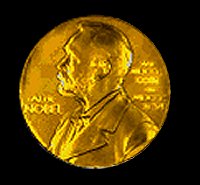The Nobel Prizes: a family tradition
For some Nobel Prize laureates, winning the coveted awards is a family tradition.

Six fathers-and-sons, four married couples and two brothers have won Nobels since the first awards were handed out in 1901.
But no one beats the Curie family ofFrance.
Marie Curie became the first woman laureate when she shared the physics prize in 1903 with her husband, Pierre. Marie went on to win a second Nobel eight years later, this time in chemistry.
Their daughter Irene Joliot-Curie followed suit, sharing the 1935 chemistry prize with her husband Frederic Joliot for their synthesis of radioactive elements.
They remain the only family to have won husband-wife awards through two generations.
On Wednesday, Roger D. Kornberg became the latest laureate to continue a Nobel family tradition when he was pronounced the winner of the 2006 chemistry award. His father, Arthur Kornberg, won the medicine prize in 1959.
Roger Kornberg still remembers joining his father at age 12 to pick up the award at a pomp-filled ceremony in Stockholm.
"I can recall vividly traveling Stockholm in 1959, at the time of my father's award. I have always been an admirer of his work and that of many others preceding me," Roger Kornberg said.
Hakan Wennerstrom, chairman of the chemistry prize committee, said Kornberg's family history may have been part of the reason he was allowed to conduct his research for more than a decade before producing a single major publication of his results. That is a rare luxury in the world of science, where financial backers often want instant results, he said.
"I guess it helps to have a father who is a Nobel laureate."
Only one father-son duo has been honored for the same Nobel Prize. In 1915, Briton William Bragg shared the physics award with his 25-year-old son Lawrence Bragg the youngest Nobel laureate ever.
Danish scientist Niels Bohr won the Nobel physics prize in 1922 and his son Aage Bohr repeated the feat in 1975. Other father-son laureates are Swedes Hans von Euler-Chelpin (chemistry, 1929) and Ulf von Euler (medicine, 1970) and Manne Siegbahn (physics, 1924) and Kai Siegbahn (physics, 1981). Briton Joseph John Thomson and his son George Thomson both won the physics prize, in 1906 and 1937, respectively.
The only siblings to bask in Nobel glory were Jan and Nikolaas Tinbergen of the Netherlands. Jan won the first award in economics in 1969 while Nikolaas won the medicine prize in 1973, reports AP.
In a 2004 article, Dutch economist Auke R. Leen examined why both brothers won Nobels despite having completely different personalities and interests.
"They did share several factors: genes and family upbringing that encouraged intellectual curiosity and independent thinking," Leen wrote.
The only Nobel Prize free of family traditions is the literature award. No direct relative of a literature prize winner is among the Nobel laureates.
Subscribe to Pravda.Ru Telegram channel, Facebook, RSS!




